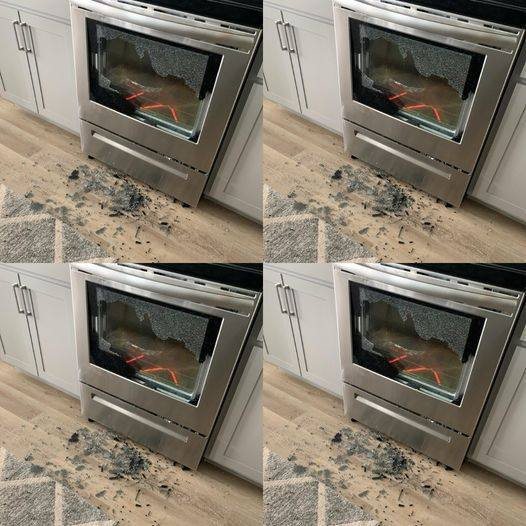An oven is one of the most essential appliances in any kitchen, relied upon for everything from baking bread to roasting a Thanksgiving turkey. However, few things are more alarming than hearing a sudden, sharp crash and discovering that your oven door glass has shattered. While this event might seem like an unpredictable freak accident, there are specific reasons why it happens, and, fortunately, steps you can take to reduce the risk of it occurring in your kitchen. Understanding why oven doors shatter and how to prevent it is key to keeping your appliance safe, functional, and long-lasting.

The Science Behind Shattering Oven Doors
Oven doors are typically made from tempered glass, specifically tempered soda-lime glass or, in some higher-end models, borosilicate glass. Tempered glass is designed to be stronger and more heat-resistant than regular glass, making it the ideal choice for an appliance that frequently experiences extreme temperatures. When tempered glass does break, it shatters into small, relatively harmless pebble-like pieces rather than dangerous sharp shards. However, even though this type of glass is durable, it is not indestructible.
The two most common reasons for an oven door shattering are glass imperfections and thermal stress. During the manufacturing process, tiny flaws or inclusions can form within the glass. One of the most notorious culprits is nickel sulfide inclusions, microscopic impurities that can cause glass to weaken over time. These inclusions can remain dormant for years but may eventually trigger spontaneous shattering, especially during a high-heat cycle like a self-cleaning mode. Self-cleaning ovens reach extremely high temperatures, often exceeding 900°F (480°C), to incinerate food residue. These extreme heat cycles can exacerbate any existing flaws in the glass, causing it to fail suddenly.
Thermal stress, on the other hand, occurs when the glass experiences rapid changes in temperature. For example, placing a cold dish directly onto a hot glass surface can create an uneven distribution of heat, causing the glass to expand and contract inconsistently. Over time, this stress can lead to hairline cracks that eventually result in a full shatter.
Common Missteps That Increase the Risk of Shattering
While glass imperfections and thermal stress are often out of your control, certain user behaviors can increase the risk of your oven door breaking. For example:
- Using Abrasive Cleaning Tools: Scouring pads or steel wool can scratch the surface of the glass, weakening its structure and creating vulnerabilities.
- Placing Heavy Objects on the Door: Some people use the oven door as a makeshift countertop when it’s open, resting heavy dishes or leaning on it. This can put excess pressure on the glass.
- Sudden Temperature Changes: Placing a frozen dish directly on a hot oven door or introducing a sudden burst of cold water onto hot glass can create thermal shock, which weakens the integrity of the glass.
- Improper Door Alignment: If the door isn’t sealing correctly or is misaligned, it may experience uneven heat exposure, increasing stress on the glass panel.
Preventive Measures to Keep Your Oven Door Safe
The good news is that preventing an oven door from shattering is largely within your control. By following these simple steps, you can significantly reduce the risk:
- Handle with Care: Avoid slamming the oven door shut. Always close it gently to prevent unnecessary stress on the glass.
- Use Soft Cleaning Tools: Stick to soft cloths or sponges and avoid abrasive cleaning products. Regular cleaning helps prevent residue buildup that could weaken the glass over time.
- Avoid Sudden Temperature Shocks: Never place a frozen dish on a hot glass door, and avoid pouring cold water on the glass when it’s still hot.
- Be Mindful of Weight: Do not use the oven door as a temporary resting spot for heavy pots, pans, or dishes.
- Check Door Alignment: Regularly inspect your oven door to ensure it’s properly aligned and sealing correctly.
- Limit Self-Cleaning Cycles: While the self-cleaning feature is convenient, frequent use exposes the glass to extreme heat repeatedly. If possible, clean your oven manually more often.
Is Spontaneous Shattering Common?
Spontaneous shattering of oven glass is relatively rare, but it does happen often enough to warrant caution. Manufacturers take several measures during production to reduce the likelihood of flaws like nickel sulfide inclusions. However, because these imperfections are microscopic and hard to detect, there’s no guarantee that a piece of tempered glass will remain flawless forever.
What to Do If Your Oven Door Shatters
If your oven door glass does shatter, do not attempt to use the oven until it’s been inspected and repaired. Clean up the shattered glass carefully, wearing protective gloves to avoid injury. Contact the manufacturer or a certified technician to replace the glass with an appropriate, high-quality replacement panel. Attempting to use a damaged oven door can be dangerous and may void your appliance’s warranty.
The Bottom Line
While the idea of an oven door suddenly shattering can be unnerving, understanding the causes behind these incidents makes them less mysterious and more preventable. Glass imperfections, thermal stress, and user habits all play a role in whether your oven door remains intact or ends up in pieces on your kitchen floor. By handling your oven door gently, avoiding rapid temperature changes, and performing regular maintenance, you can keep your oven in good working condition and reduce the risk of accidents.
In the end, simple precautions go a long way. Treat your oven door with care, and it will continue to serve you safely and efficiently for years to come.





